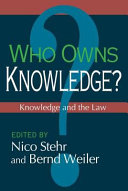

Most ebook files are in PDF format, so you can easily read them using various software such as Foxit Reader or directly on the Google Chrome browser.
Some ebook files are released by publishers in other formats such as .awz, .mobi, .epub, .fb2, etc. You may need to install specific software to read these formats on mobile/PC, such as Calibre.
Please read the tutorial at this link: https://ebookbell.com/faq
We offer FREE conversion to the popular formats you request; however, this may take some time. Therefore, right after payment, please email us, and we will try to provide the service as quickly as possible.
For some exceptional file formats or broken links (if any), please refrain from opening any disputes. Instead, email us first, and we will try to assist within a maximum of 6 hours.
EbookBell Team

4.8
104 reviewsWho Owns Knowledge? explores the emerging linkages between the extension of knowledge and the law. It anticipates that the legal system will not only be called upon to adjudicate in matters of creative minds, but will be expected to do so to an ever increasing degree.
Linkages between the legal system and knowledge are bound to multiply in modern societies. Ironically, while increasingly relying on knowledge, we are simultaneously investing significant resources into controlling this same knowledge. This includes developing a system of legal governance over how knowledge is extended or enlarged. Such modes of governance may take the form of regulatory legal codes, or legal challenges and judgments that shape the evolution of modern society and potentially transform knowledge itself, as a productive force. Who Owns Knowledge? asks such questions as: What is the appropriate balance of public and private interests involved in this process? How can creative powers, natural resources and indigenous knowledge be protected from either public or private exploitation? Does the law have the power to prevent this exploitation, or is adaptive technology needed? Also, in this identity theft conscious age, how can the rights of the individual be protected against policies allowing access to any kind of information, especially confidential information? The editors and contributors demonstrate that the relationship between knowledge and the law needs to be further researched and discussed. Who Owns Knowledge? is a must-read for those interested in the subjects of intellectual property, the history and development of modern legal and economic systems and their entanglements, and how judicial systems make choices between the legal and economic systems and, especially, between the public and private good and their often opposing interests.